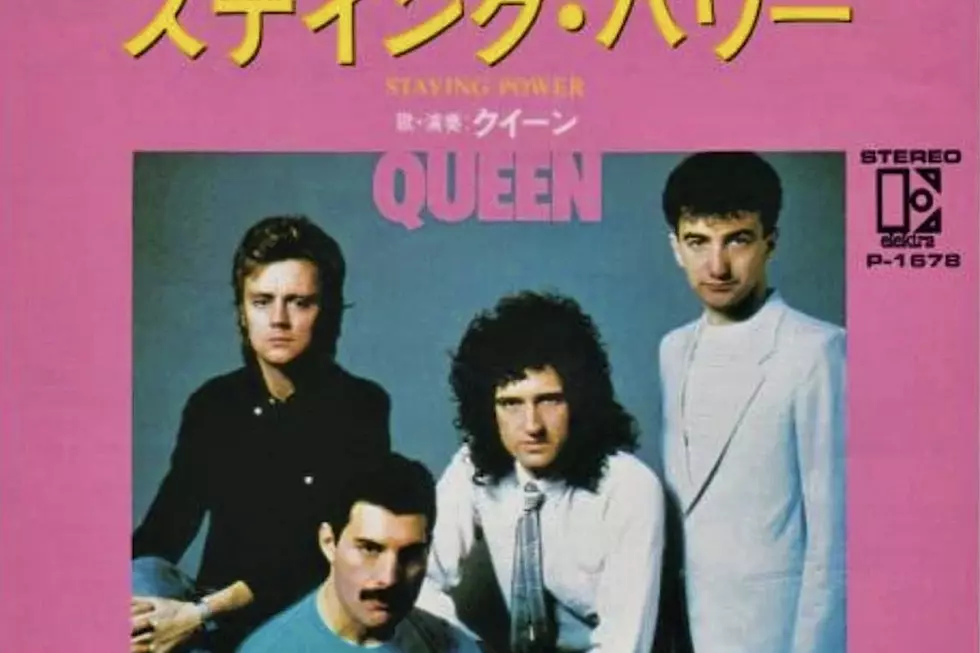
40 Years Ago: Queen’s Dance-Influenced ‘Staying Power’ Disappoints Fans
It's an ironclad law that sooner or later every band makes at least one decision that everyone hates. For fans of Queen, the realization that this was finally happening came with "Staying Power," the opening track on 1982's Hot Space which (mercifully, in the minds of many) made its only appearance as a single in Japan.
Queen had gone on a long, miraculous run in the '70s, reeling off album after album of rock 'n' roll that swung from the heavy to the operatic and back again, often in the same song. Their first appearances in the new decade had been just as wonderful and odd.
The Game was a smash hit in 1980, hitting No. 1 on the U.S. charts and eventually selling more than 4 million copies, despite the fact that it featured a more pop-oriented sound and introduced that most-'80s of instruments into the band's repertoire for the first time: the synthesizer. They followed this up with the quirky, wonderful soundtrack to the film Flash Gordon, which was maybe the most high-camp, operatic work Queen had ever released.
It's reasonable then to assume that a listener laying Hot Space onto their turntable might be expecting more of the same hard rock with a twist. But what they got was something entirely different: a slap-in-the-face reminder that a new decade had arrived and was pulling everything into its gravitational field.
"Staying Power" begins things with an '80s-style cheese-funk bass line (actually played by lead singer Freddie Mercury on a synth) and a disco-style drum beat. The latter features a cow bell and the era's signature snaky drum noise that registers somewhere between the sound of a snare and a high hat.
Listen to Queen's Studio Version of 'Staying Power'
So, it was immediately clear that a musician wasn't playing. Instead, Queen was using a programmed track. (Drummer Roger Taylor did the honors, on a Linn LM-1 drum machine.) This was drastically different: a band that prided itself on its accomplished musicianship had decided to go in an entirely new direction.
The next element of "Staying Power" finished pushing the single out onto the dance floor. Immediately after Mercury slides into the vocals, an up-tempo funk/pop horn section arranged by longtime Atlantic Records producer Arif Mardin leaps in behind him. From there, the song unfolds into something that totally divergent. "Staying Power" was electronically-driven, rhythm-oriented, and seemingly meant to be played in a disco rather than at a rock show.
The lyrics reinforce this with a series of sexual double-entendres. Mercury then seems to challenge his own fans with the chorus of "you and me got staying power": No matter what they think of this new direction, they'd be foolish to think that Queen can't ride it through to success.
Unfortunately, and maybe predictably, that didn't happen. Neither "Staying Power" nor Hot Space were well regarded. The album broke a string of non-soundtrack platinum successes going back to 1975's masterpiece A Night at the Opera – and the single failed to chart after its release on July 31, 1982.
These stumbles ended up causing a certain amount of recrimination.
Listen to Queen Perform 'Staying Power' in Concert
The difficult sessions in Munich that produced most of Hot Space came to be recognized as one of the low points in Queen's career. (This LP's sole acknowledged gem, the tacked-on David Bowie duet "Under Pressure," came from an earlier jam in the band's studio at Montreux.)
Mercury's personal manager Paul Prenter was subsequently accused of having a deleterious influence on the band's sound. Taylor went on to admit to DJ Jim Ladd that "everybody in the band" felt that they had strayed too far in the direction of disco.
What's fascinating decades later is how true to type "Staying Power" sounds in context with pop music from the '80s. There have long been rumors that the song and the album influenced Michael Jackson's "Thriller." Whether or not these are founded, one can certainly hear the similarity. In fact, "Staying Power" fits in with an enormous amount of the pop music released in the first part of the decade.
There might have been a lot of disdain at the time for that music among certain fans – the slogan "Disco Sucks!" survived well into the '80s – but a lot of musicians still did wonderful things with it. In context, Queen's work on Hot Space doesn't sound so bad, after all. Instead, it just sounds like a band hearing what was happening around them and letting it seep into their music.
Is "Staying Power" likely to enjoy any grand reevaluation as a lost classic? Probably not. Queen simply strayed too far from what they did really well. Still, "Staying Power" certainly isn't terrible, and the song captures a lot of the feeling of the moment in which it was made. Queen may have disappointed some fans, but "Staying Power" is better seen now as an interesting experiment instead of an abysmal failure.
20 B-Sides That Became Big Hits
Queen’s Outsized Influence
More From Ultimate Classic Rock









